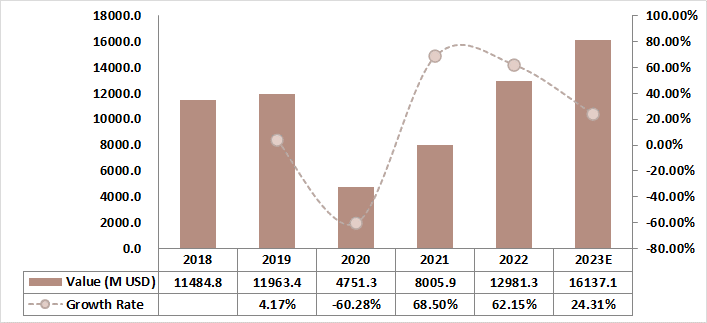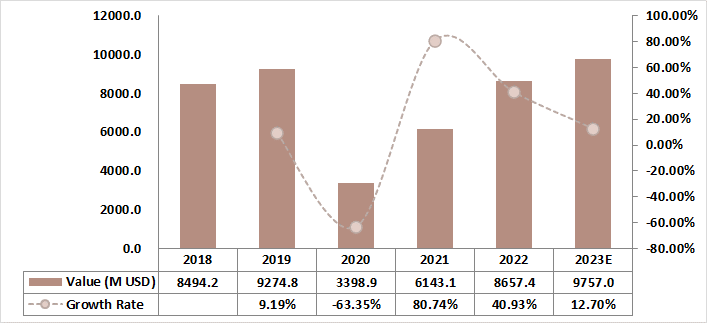1. Global Leisure Travel Market Revenue Share of Key Players
Booking Holdings held 0.29% of the market share in 2018, which fell slightly to 0.28% in 2019, but grew to 0.32% in 2021 and is expected to reach 0.35% in 2023. Expedia’s market share fell from 0.22% in 2018 to 0.16% in 2020 and is expected to rebound to 0.21% in 2023. Airbnb’s market share grew from 0.08% in 2018 to 0.09% in 2019 and is expected to reach 0.17% in 2023. Alibaba’s market share grew from 0.14% in 2018 to 0.15% in 2019 and is expected to fall to 0.05% in 2023. The market shares of other companies are relatively small, indicating that there are still many small companies competing in the market.
Table Global Leisure Travel Revenue Share of Key Players (2018-2023)
|
|
2018 |
2019 |
2020 |
2021 |
2022 |
2023E |
|
Booking Holdings |
0.29% |
0.28% |
0.22% |
0.32% |
0.33% |
0.35% |
|
Expedia |
0.22% |
0.22% |
0.16% |
0.25% |
0.22% |
0.21% |
|
Airbnb |
0.08% |
0.09% |
0.13% |
0.20% |
0.18% |
0.17% |
|
Ctrip.Com International |
0.08% |
0.10% |
0.09% |
0.10% |
0.06% |
0.05% |
|
Alibaba |
0.14% |
0.15% |
0.06% |
0.06% |
0.04% |
0.05% |
|
TripAdvisor |
0.04% |
0.03% |
0.02% |
0.02% |
0.02% |
0.02% |
|
MakeMyTrip |
0.01% |
0.01% |
0.01% |
0.01% |
0.01% |
0.01% |
|
Trivago |
0.03% |
0.02% |
0.01% |
0.02% |
0.01% |
0.01% |
|
Webjet |
0.01% |
0.01% |
0.00% |
0.01% |
0.01% |
0.01% |
|
Hostelworld |
0.00% |
0.00% |
0.00% |
0.00% |
0.00% |
0.00% |
|
Yatra Online |
0.00% |
0.00% |
0.00% |
0.00% |
0.00% |
0.00% |
|
Tuniu |
0.01% |
0.01% |
0.00% |
0.00% |
0.00% |
0.00% |
|
Others |
99.09% |
99.08% |
99.28% |
99.02% |
99.11% |
99.12% |
|
Total |
100.00% |
100.00% |
100.00% |
100.00% |
100.00% |
100.00% |
2. Booking Holdings Leisure Travel Market Analysis
2.1 Booking Holdings Business Overview
Booking Holdings Inc (Booking Holdings), is a provider of online travel and related services. The company offers various services including accommodation reservation, price comparison, rental car reservation, restaurant reservations, airline ticket booking, vacation packages, cruise booking, and travel reservation. It operates business under brands such as Booking.com, Agoda, Priceline, KAYAK, Rentalcars.com, and OpenTable. Booking Holdings provides its services to consumers and local partners. It provides restaurant operators with restaurant reservation management and customer acquisition services.
2.2 Service Introduction
Table Service Introduction
|
THE WORLD’S LEADING PROVIDER OF ONLINE TRAVEL AND RELATED SERVICES |
|
Our Business Model We derive substantially all of our revenues from providing online travel reservation services, which facilitate online travel purchases between travel service providers (which we generally refer to as “partners”) and travelers (which we generally refer to as “consumers”). We also earn revenues from advertising services, restaurant reservations, and various other services, such as travel-related insurance products and restaurant management services for restaurants. |
2.3 Booking Holdings Market Performance Analysis
In 2018, Booking Holdings’ leisure travel market value was US$11,484.8 million, its gross profit was US$8,809.7 million, and its gross profit margin was 76.71%. In 2019, the value increased to US$11,963.4 million, the gross profit was US$9,115.4 million, and the gross profit margin dropped slightly to 76.19%. However, due to the impact of the epidemic in 2020, the company’s value dropped significantly to US$4751.3 million, its gross profit dropped to US$3614.3 million, and its gross profit margin also dropped to 76.07%. In 2021, as the market recovered, Booking Holdings’ value rebounded to US$8,005.9 million, gross profit was US$6,585.6 million, and gross profit margin increased significantly to 82.26%. In 2022, the company continued to show strong growth, with a value reaching US$12981.3 million, gross profit of US$10847.2 million, and gross profit margin further rising to 83.56%. It is expected that by 2023, Booking Holdings will be worth US$16137.1 million, with a gross profit of US$13741.4 million and a gross profit margin of 85.15%.
Table Booking Holdings Market Performance Analysis (Value, Gross, Gross Margin)
|
Booking Holdings |
2018 |
2019 |
2020 |
2021 |
2022 |
2023E |
|
Value (M USD) |
11484.8 |
11963.4 |
4751.3 |
8005.9 |
12981.3 |
16137.1 |
|
Gross (M USD) |
8809.7 |
9115.4 |
3614.3 |
6585.6 |
10847.2 |
13741.4 |
|
Gross Margin |
76.71% |
76.19% |
76.07% |
82.26% |
83.56% |
85.15% |
The value of Booking Holdings in 2018 was US$11,484.8 million, and the value increased to US$11,963.4 million in 2019, with a growth rate of 4.17%. However, due to the impact of the epidemic in 2020, the company’s value dropped significantly to US$4751.3 million, with a growth rate of -60.28%. In 2021, as the market recovered, Booking Holdings’ value rebounded to $8005.9 million, with a growth rate that increased significantly to 68.50%. In 2022, the company continued to grow, reaching a value of US$12981.3 million, with a growth rate of 62.15%. It is expected that the value of Booking Holdings will reach US$16137.1 million in 2023, with a growth rate of 24.31%.
Figure Booking Holdings Value and Growth Rate 2018-2023

3. Expedia Leisure Travel Market Analysis
3.1 Expedia Business Overview
Expedia Group Inc (Expedia Group) is an online travel company. The company provides a wide range of services, which includes booking of hotel rooms, airline seats, car rentals, and destination services through its travel suppliers. The company offer these services under various brands including Expedia.com, Hotels.com, Vrbo, Orbitz, ebookers, CheapTickets, Hotwire, CarRentals .com, Travelocity, Traveldoo, Expedia Partner Solutions, and Wotif Group. Expedia Group serves customers through mobile bookings, alternative distribution channels, private label businesses, and call centers. The company also carries out advertising and media business and travel management businesses.
3.2 Service Introduction
Table Service Introduction
|
Business Models |
|
We make travel products and services available both on a stand-alone and package basis, primarily through the following business models: the merchant model, the agency model and the advertising model. Merchant Model. Under the merchant model, we facilitate the booking of hotel rooms, alternative accommodations, airline seats, car rentals and destination services from our travel suppliers and we are the merchant of record for such bookings. For example, we provide travelers access to book hotel room reservations through our contracts with lodging suppliers, which provide us with rates and availability information for rooms but for which we have no control over the rooms and do not bear inventory risk. Our travelers pay us for merchant hotel transactions prior to departing on their trip, generally when they book the reservation. The majority of our merchant transactions relate to lodging bookings. Agency Model. Under the agency model, we facilitate travel bookings and act as the agent in the transaction, passing reservations booked by the traveler to the relevant travel provider. We receive commissions or ticketing fees from the travel supplier and/or traveler. We record revenue on air transactions when the traveler books the transaction, as we do not typically provide significant post booking services to the traveler and payments due to and from air carriers are typically due at the time of ticketing. Additionally, we generally record agency revenue from the hotel when the stayed night occurs as we provide post booking services to the traveler and, thus consider the stay as when our performance obligation is satisfied. The majority of our agency gross bookings relate to air bookings. Advertising Model. Under the advertising model we offer travel and non-travel advertisers access to a potential source of incremental traffic and transactions through our various media and advertising offerings across several of our transaction-based websites, as well as on our majority-owned metasearch site, trivago. |
3.3 Expedia Market Performance Analysis
In 2018, Expedia’s leisure travel market value was US$8,494.2 million, its gross profit was US$6,300.5 million, and its gross profit margin was 74.17%. In 2019, the company’s value increased to US$9274.8 million, gross profit was US$6891.4 million, and gross profit margin increased slightly to 74.30%. However, the company’s value dropped significantly to US$3398.9 million in 2020, gross profit dropped to US$2539.0 million, and gross profit margin also dropped to 74.70%. In 2021, Expedia’s value rebounded to US$6143.1 million, gross profit was US$4878.0 million, and gross profit margin increased significantly to 79.41%. The value in 2022 will reach US$8,657.4 million, the gross profit will be US$6,943.6 million, and the gross profit margin will further increase to 80.20%. It is expected that Expedia’s value will reach US$9757.0 million by 2023, with a gross profit of US$8033.7 million and a gross profit margin of 82.34%.
Table Expedia Market Performance Analysis (Value, Gross, Gross Margin)
|
Expedia |
2018 |
2019 |
2020 |
2021 |
2022 |
2023E |
|
Value (M USD) |
8494.2 |
9274.8 |
3398.9 |
6143.1 |
8657.4 |
9757.0 |
|
Gross (M USD) |
6300.5 |
6891.4 |
2539.0 |
4878.0 |
6943.6 |
8033.7 |
|
Gross Margin |
74.17% |
74.30% |
74.70% |
79.41% |
80.20% |
82.34% |
Expedia’s value in 2018 was US$8,494.2 million, and its value increased to US$9,274.8 million in 2019, with a growth rate of 9.19%. The company’s value dropped significantly to $3398.9 million in 2020, with a growth rate of -63.35%. Expedia’s value rebounded to $6143.1 million in 2021, with a significant growth rate of 80.74%. The value will reach US$8657.4 million in 2022, with a growth rate of 40.93%. It is expected that Expedia’s value will reach US$9757.0 million in 2023, with a growth rate of 12.70%.
Figure Expedia Value and Growth Rate 2018-2023






